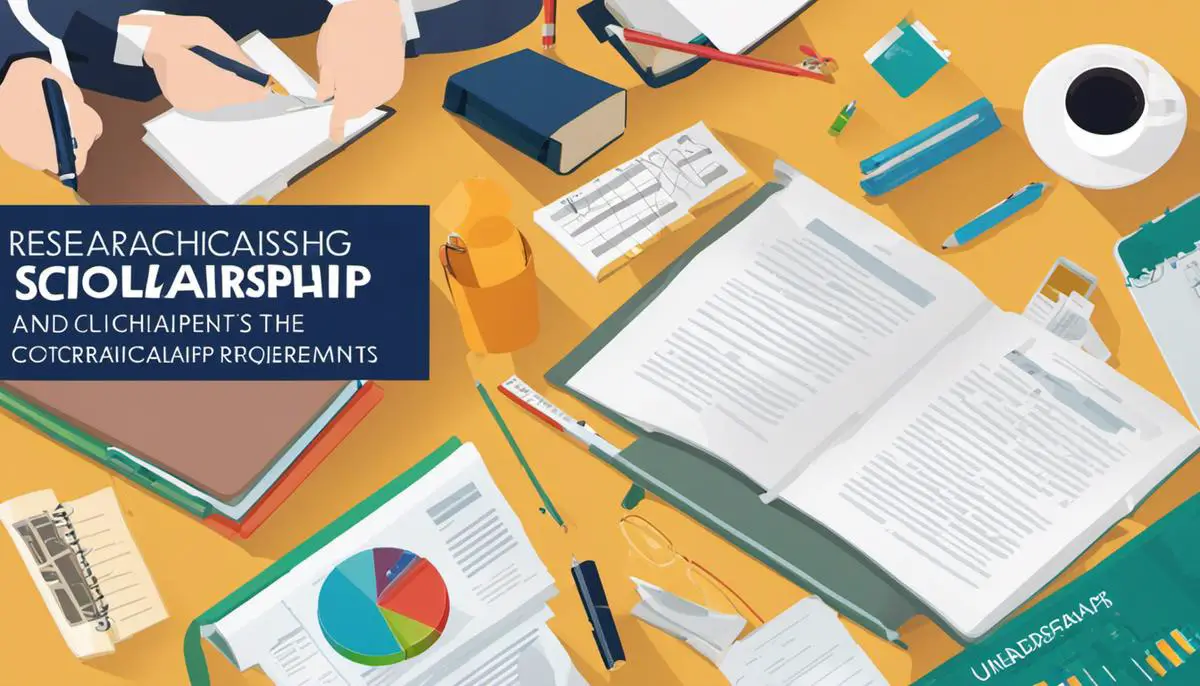Securing Post-Graduation Scholarships for Studying Abroad
Education and personal growth are two journeys that go hand in hand, offering unparalleled opportunities for those who seize them. One such opportunity is the chance to study overseas, an adventure that combines immersive cultural experiences with world-class education. However, affording international studies can be challenging. Scholarships offer a pathway to overcome this financial hurdle from a variety of sources, including universities and other organizations that promote global learning. This guide will delve into the complexities of identifying and securing scholarships for foreign study, starting from understanding the required qualifications and scholarship types, to navigating the application process and acing any subsequent interviews.
Understanding Scholarship Requirements
Understanding Scholarship Requirements
To successfully secure a scholarship for studying abroad, you must first understand the requirements that different scholarship programs demand. This typically involves researching various scholarships that are available for international studies and looking at their eligibility criteria. The qualifications that scholarship programs consider can vary; some may place greater emphasis on academic achievements while others may focus more on leadership abilities or community involvement.
Highlighting Academic Achievements
Showing off your academic achievements can considerably improve your chances of securing a scholarship. These can include, but aren’t limited to, grades, achievements in certain subjects, and class ranking. Perfect scores on standardized tests such as the SAT or ACT are highly prized. Other accomplishments considered include any honors or advanced placement classes you’ve taken and significant improvement in your academic performance over time. Ensure you gather up these credentials for your application.
Language Proficiency Memberships and Certifications
For scholarships in non-English speaking countries, proof of proficiency in the relevant foreign language may be required. Certificates such as the Test of English as a Foreign Language (TOEFL), or the International English Language Testing System (IELTS) for English, and the Diplôme d’Etudes en Langue Française (DELF) or Test d’Evaluation de Français (TEF) for French, among others, can illustrate your language proficiency. You may also be required to join certain memberships or acquire additional certifications, depending on the scholarship program.
Other Qualifications
Additional qualifications may include involvement in extracurricular activities such as sports, theatre, or community service. Leadership roles in any organizations you’re part of, any regional, national, or international awards you’ve received, and demonstrated financial need, are also potential factors. Make sure you compile a comprehensive list of all your qualifications for reference during your application process.
Preparing Necessary Documents for Application
Application to study abroad scholarships often involves submitting a series of documents. These commonly include academic transcripts, letters of recommendation, a resume or CV, proof of citizenship or residency, and any specific documents required by the scholarship committee. For letters of recommendation, choose mentors, teachers, or employers who can attest to your skills, qualifications, and suitability for the scholarship. Your CV should detail your academic history, work experience, volunteer work, and relevant skills or activities that align with the requirements of the scholarship.
Ensuring that you understand the scholarship requirements, have the necessary qualifications and have prepared all the documents required, raises your chances of securing a scholarship for studying abroad.

Finding Suitable Scholarships
Identify Your Qualifications and Aspirations
Before searching for scholarships, it is essential to clearly identify your qualifications and aspirations. Consider your academic or professional accomplishments, involvement in extra-curricular activities, passion for a certain subject area, and long-term career goals. This will help you in narrowing down which scholarships you will be most eligible for and which ones align with your career goals.
Find Scholarship Providing Organizations
Several organizations offer scholarships to study abroad. These organizations may include educational institutions, government agencies, non-profit organizations, private companies, or foundations. Generally, they promote some form of international understanding or specific academic disciplines.
Utilize Online Scholarship Databases
Online scholarship databases can be an excellent place to begin your search. These platforms allow you to filter search results based on various factors like the destination country, field of study, eligibility criteria, etc. The websites like InternationalScholarships.com, ScholarshipPortal.com, and Fastweb.com offer a comprehensive list of available scholarships for international studies.
Contact Your Preferred Foreign Universities
Often, universities offer their own scholarships for international students. You might check the websites of the schools you want to apply to and look at their financial aids or scholarships page. Email them directly if you can’t find specific information.
Search for Government Scholarships
Various governments offer scholarships to attract international students. For example, the US Department of State’s Bureau of Educational and Cultural Affairs provides multiple scholarships for non-US students wishing to study in the US. Other countries, like the UK, Canada, Australia, and Germany, also offer similar programs. Refer to the official government websites for the most accurate and updated information.
Make a List of Potential Opportunities
After conducting a detailed search, make a list of the scholarships for which you are eligible and align with your aspirations. Pay close attention to the details – the scholarship amount, application deadline, terms and conditions, and particularly, the desired qualifications. This organized list will help you track your applications and keep careful note of deadlines.
Apply Early and Regularly
Most scholarships have stringent deadlines. Start rounds of application as soon as possible. As some scholarships are based on a first-come, first-serve basis, applying early might increase your chances. Additionally, regularly check as new scholarships might pop up throughout the year.
Mind the Requirements
Each scholarship has its own set of requirements – GPA, letters of recommendation, essays, etc. Make sure you fulfill all of them before sending your application. A well-thought, complete, and error-free application will increase your chances of being awarded the scholarship.

Application Process for Scholarships
Research Available Scholarships
Start by researching scholarships that are available for studying abroad. There are many resources online that list scholarships and provide information about eligibility criteria. Universities and colleges often have information about scholarships on their websites, as well as local education departments and organizations. The Institute of International Education is also a reliable resource for finding scholarships for studying abroad.
Prepare Documents in Advance
Documents necessary for scholarships typically include personal information proof, school transcripts, recommendation letters, and a statement of purpose or a scholarship essay. It is beneficial to gather these documents before beginning the application process. While school transcripts can be obtained from your current institution, recommendation letters should ideally be written by professors or employers who are acquainted with your scholarship-related goals and personality traits.
Understanding the Timeline
Each scholarship has a specific deadline for application submission. It’s advised to mark these dates on a calendar or planner application in order to avoid missed opportunities. You should start preparing your application package at least a few months in advance. Always aim to submit your application well ahead of the deadline as it reflects seriousness and planning.
Filling out the Application
Ensure that you have all the necessary information before you start filling out the scholarship application form. Follow the instructions provided by the scholarship organization precisely. Provide complete and accurate information about your personal details, educational background, and future study plans. Some scholarships might require additional information like your family’s financial status or community involvement.
Writing Scholarship Essays
Many scholarship programs require an essay or personal statement as part of the application. This is your opportunity to truly distinguish yourself from other candidates. It’s essential to clearly communicate your ambitions, inspirations, strengths and how you plan to use the scholarship to achieve your goals. Seek guidance from a teacher, mentor, or online resources to construct an effective essay. Be authentic and make sure you proofread your essay for any grammatical or structural errors.
Application Review and Submission
Before submitting the application, take the time to carefully review all the information. Accuracy is essential as the slightest error can lead to disqualification. Make sure you have included all the necessary documents required by the scholarship program. Submit the application as instructed by the scholarship provider. If submitting online, ensure that all documents have uploaded correctly and you have received a confirmation of submission.

Photo by kimberlyfarmer on Unsplash
Interview Preparation
Step One: Research Scholarship Interview Questions
Understanding the potential questions that you might be asked during a scholarship interview is critical. Some frequent themes might include your financial needs, why you deserve the scholarship, how you will contribute to the university or program, your proposed area of study, and your long-term career goals. You may also be asked about any relevant skills, experiences, or attributes that could be beneficial to your proposed area of study and eventual career. For certain scholarships, be prepared to discuss your understanding of the scholarship’s purpose and your plans to contribute to the scholarship’s underlying aim.
Step Two: Improving Communication and Presentation Skills
Effective communication and presentation are crucial elements in the scholarship interview process. A well-developed answer is more persuasive when it is articulately communicated. Develop your answers with a clear beginning, middle, and end, ensuring they stay relevant to the question. Good presentation skills are also crucial. Dress professionally, maintain good posture and eye contact, be authentic in your responses, and remember to listen carefully to the question before answering.
Step Three: Crafting Your Unique Story
Scholarship committees are interested in more than just academic qualifications; they want to understand your unique journey. Try to weave a narrative throughout your interview. Talk about the hardships you have overcome, the milestones you have achieved, and how these experiences have shaped the person you are today. Discuss how these experiences have influenced your desire to study abroad and your course choices.
Step Four: Mock Interview Practice
Practice makes perfect, and the same is true for interviews. Simulate the interview environment and role-play with a friend or mentor. Use questions that you found during your research to ensure that they are relevant. Each mock session will provide insights into areas you need to improve or refine.
Step Five: Understand the Evaluation Criteria
Different scholarships may have different evaluation metrics. Research or ask about the criteria that will be used to evaluate your interview. Is it communication skills, ability to express ideas, or presentation skills that are most important? This understanding will help you emphasize the right areas during your preparation and interview.
Step Six: Relax and Show Your Passion
An interview is a formal occasion, but it doesn’t mean you have to suppress your personality or enthusiasm for the study and travel opportunities a scholarship presents. Show your passion through the conversation and let the panel see your excitement and commitment. This enthusiasm can sometimes be the deciding factor between two equally qualified candidates.
Remember, preparations would always give you an edge, but the key lies in being your true self throughout the interview process.

The journey of securing a scholarship to study abroad can be both challenging and rewarding. Along this path, you will not only learn about the myriad of opportunities that exist but also deepen your understanding of your own ambitions and abilities. By thoroughly researching scholarships, understanding their demands, and preparing effectively for applications and interviews, you can create strong scholarship representations of yourself. Ultimately, you would have opened the door to experiences and learning opportunities that will profoundly influence your personal and professional development. The world is filled with educational opportunities ripe for exploration, and scholarships are your passport. So, prepare, apply, and reach for your global educational dreams.
Writio: The AI content writing mastermind for websites and blogs. This article was created by Writio.







